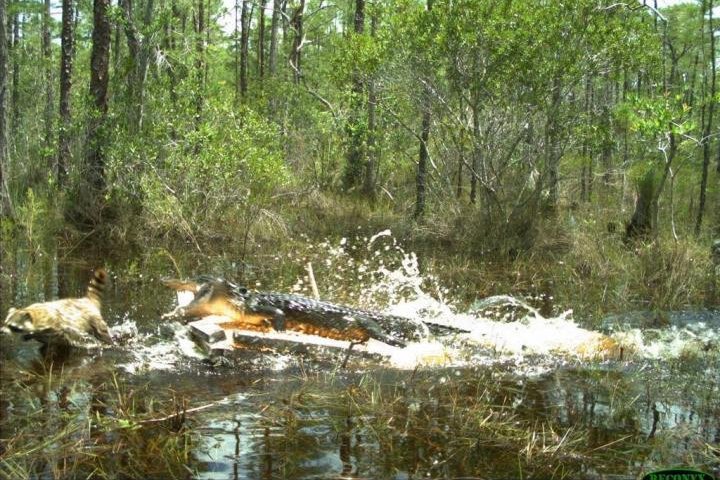An alligator chases a racoon from a South Florida swamp. Photo by Florida Fish and Wildlife Conservation Commission
GAINESVILLE, Fla., March 4 (UPI) -- When birds need some muscle to keep nest-invaders at bay, they look to alligators. In return, gators get the odd dead baby bird tossed from the nest.
Such is the quid pro quo relationship between the birds and leathery reptiles of the southern United States -- a relationship detailed in the latest issue of the journal PLOS ONE.
"We have known for some time that ibises, storks, spoonbills and herons seem to always have alligators underneath their nests," Peter Frederick, a professor in the department of wildlife ecology and conservation at the University of Florida, explained in a recent news release. "Alligators are serving as nest protectors – keeping raccoons out of the colony, which are otherwise devastating nest predators."
But what wasn't clear until now, was what the gators were getting out the arrangement.
The latest research by Frederick and his colleagues suggests alligators living under the nests of aquatic birds are healthier than their peers. Because most birds hatch a couple more chicks than nurture, at least one or two of each year's hatchlings don't make it. Those who perish get tossed into the swamp below, becoming gator food.
"We estimate that in years with especially high bird nesting, most of the breeding female alligators in the Everglades could be supported during the four–month dry season by dropped chicks alone," said Lucas Nell, study co-author and grad student at Florida. "So, associating with birds may help the gator population to persist in this otherwise harsh habitat."
The arrangement is less explicit than other forms of cooperation seen in nature, but it's subtly doesn't subtract from its ecological significance.
"Colonial birds and alligators occur together throughout the subtropical and tropical biomes of the world, and it seems likely that this relationship is important worldwide," Frederick said. "For this reason, we believe that the relationship itself should be a focus of international conservation efforts."















